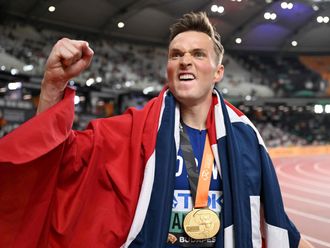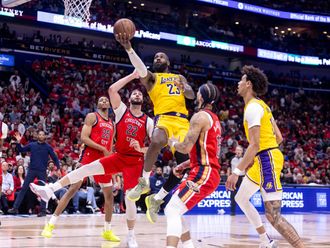Dubai: Chris Eubank lost his killer instinct the day he cut short Michael Watson’s career with a near-fatal uppercut in a WBO super-middleweight world title fight back in September 1991.
Watson was in a coma for 40 days, had six brain operations, and was in a wheelchair for six years, leaving Eubank wracked with guilt and unable to finish off subsequent fights.
Fast-forward 25-years to March 2016 and Eubank’s son, Chris Eubank Junior, was involved in a similar incident with Nick Blackwell, leaving Blackwell in a coma for a week and unable to return to boxing.
So, will it affect Junior — who has his first world title fight against Renold Quinlan in London on February 4 — in the same way it did his dad? Senior thinks not.
“We don’t go in there looking to incapacitate or maim, we go in there looking to score points by striking and not being struck,” Eubank told Gulf News in an exclusive phone interview.
“Junior understands that and will become more ferocious and train even harder because he doesn’t want what happened to Nick to happen to himself.
“Nobody wants to hurt their opponent for a lifetime, just 10 seconds, but that’s the dilemma, how do you actually do that?”
From his own experience, Eubank said Watson’s injury made him more reflective.
“And while that aided me in many respects it didn’t aide me in my boxing career, because I lost the ability to finish fights, and I wouldn’t advise my son to do the same.
“Junior was two-years-old when the Watson fight took place, so he’s grown up around all that went on. Well, it’s still going on, it hasn’t left us, and I’ve had to constantly deal with that.”
Was it wise for Eubank to continue fighting?
“I had no choice, I had a family to feed and didn’t go to University, I don’t have any degrees in any other subject, I have a couple of world title belts and they are my degrees, effectively.”
He famously declared that boxing was ‘a mug’s game’, so then why has he allowed his son to follow in his footsteps?
“I was never anti-boxing. It may have appeared that way, but what I meant was that promoters mug fighters off.
“Fighters are not given the lion’s share of revenue, which is accumulated through their hard work, sweat, tears and sacrifice.
“My son will not suffer the misuse I experienced. My job is to protect him from what they did to me, I’m not angry, I’m not bitter about it, because it’s just a game, I don’t despise the game, I’m just playing it in favour of my son.”
Even before the Watson fight, Eubank was a fighter that everyone loved to hate. He strutted around the ring with an arrogance that many wanted to see stopped, and was renowned for his bitter rivalry with Nigel Benn.
Outside the ring, he took on an eccentric and flamboyant persona that alienated many, wearing a monocle, jodhpurs and tweed, while quoting Shakespeare and driving a truck.
“People hadn’t seen this before and thought it was quite unusual, they must have thought I was a pretender and if this guy is pretending then there’s no way he could become world champion, but I kept on proving them wrong.”
Did they think he was a pretender because it may have been unusual to see a black man in such aristocratic attire, and was he dressing like that in an attempt to change stereotypes?
“It was fun, and it was fun mainly because of my complexion. Whatever else it was able to do unconsciously, because it wasn’t conscious, is a by-product, because I was just being myself.
“In my head I’ve never had a complexion so I wasn’t shackled or stressed by what usually stresses, and keeps the masses shackled.
“If I had any of these issues in my head I would have capped myself, but I’ve been able to keep striving, rising and inspiring through love and being objective.”
At first, he says his career was about gaining acceptance from his brothers, but it soon turned into a fight for acceptance from the crowd.
“It didn’t hurt; it baffled me, like it baffles me why my brothers were so harsh.
“Maybe from someone else’s view it was just how brothers are, but perhaps I took that and it inspired an incandescent rage within me, and I used that perception to make myself a winner.
“I knew that if I could win the audience I would have won my brothers and it took many years and impossible fights, but I did it.”
Ironically, the crowd only turned in his favour towards the end of his career when he started losing.
“It makes sense of the human condition. You think that to be respected and loved it’s about winning fights, but it turns out it’s about having heart or the ability to take a beating.
“It’s about humility, grace and dignity. I always exuded the same from the start, but there was a great deal of bigotry, people are just built to go with the tide and current of the system.
“I was aware that they shouldn’t have been that way, because I was correct, I was proper and I was genuine.
“I don’t look at it as a bad thing that the crowd were against me, because it is what gave me the fuel to prove them wrong; they made me better by not giving me respect.
“I may have actually taken a little bit of the firepower out of Junior’s drive by accepting him and telling him I’m proud of him, but I think I can do that because he’s so good, he has an ability that was better than mine.”
Raised in Peckham and the Bronx, the two toughest areas of London and New York, Eubank says his upbringing was perfect conditioning.
“I can look back now and say I’m so grateful for the pressure, so grateful for the poverty, so grateful for the bigotry, so grateful for these things I’ve actually been able to use for my benefit.
“The only thing I needed to learn in actual fact was to embrace it and it’s so difficult to see, they call it the elusive obvious, so many people can’t see that everything that is negative can be used for your benefit, you just have to embrace it.”
While there are many similarities between Eubank Senior and Junior, the latter hasn’t had to go through what his father endured. But Senior says that won’t stop his son reaching similar heights.
“He’s never wanted for anything as a child, and most people have had to come from a place of lack, or of poverty, to actually have the drive to do what they do.
“But he has the drive to achieve through it just being his thing. He’s not really supposed to be able to do what he does, it’s just that his energy, focus and relentlessness is remarkable, so perhaps he doesn’t need all the harshness I went through to be able to achieve the heights. Maybe my guidance and his natural desire is enough.”












